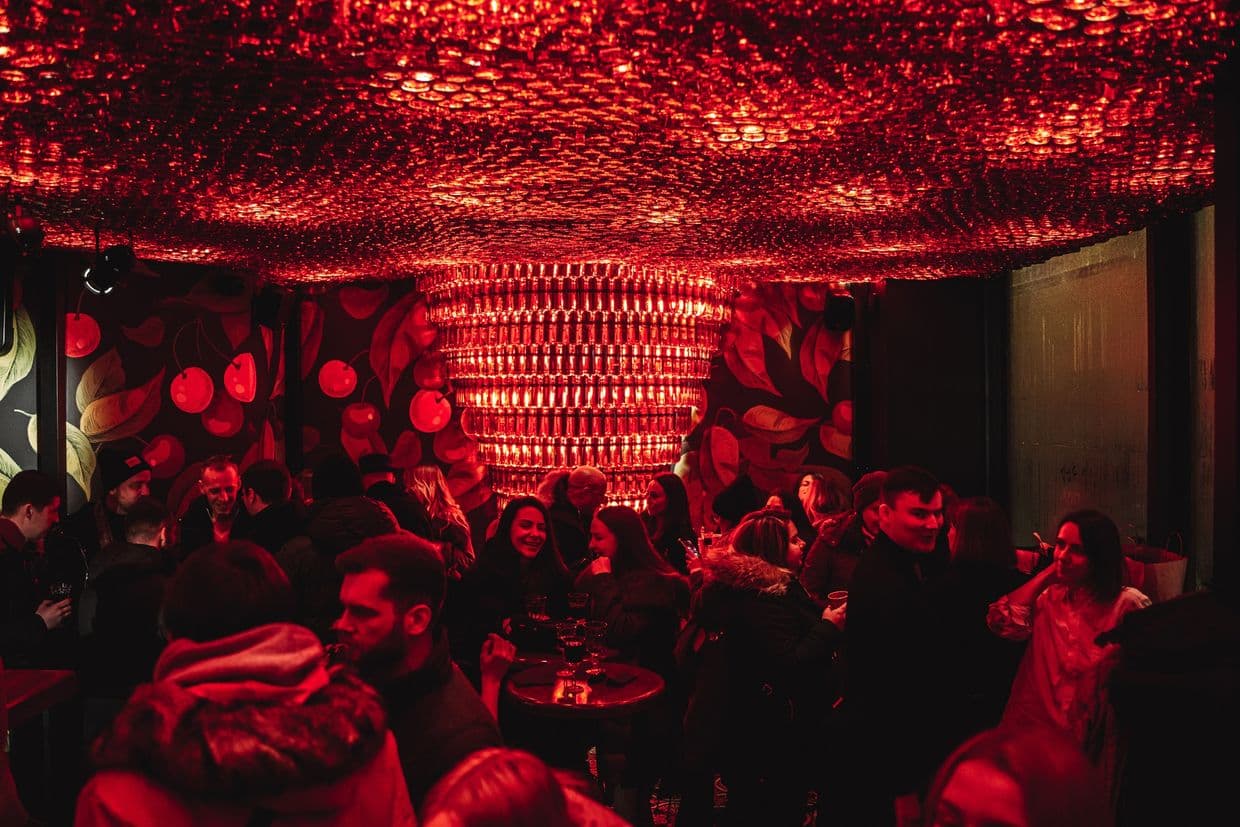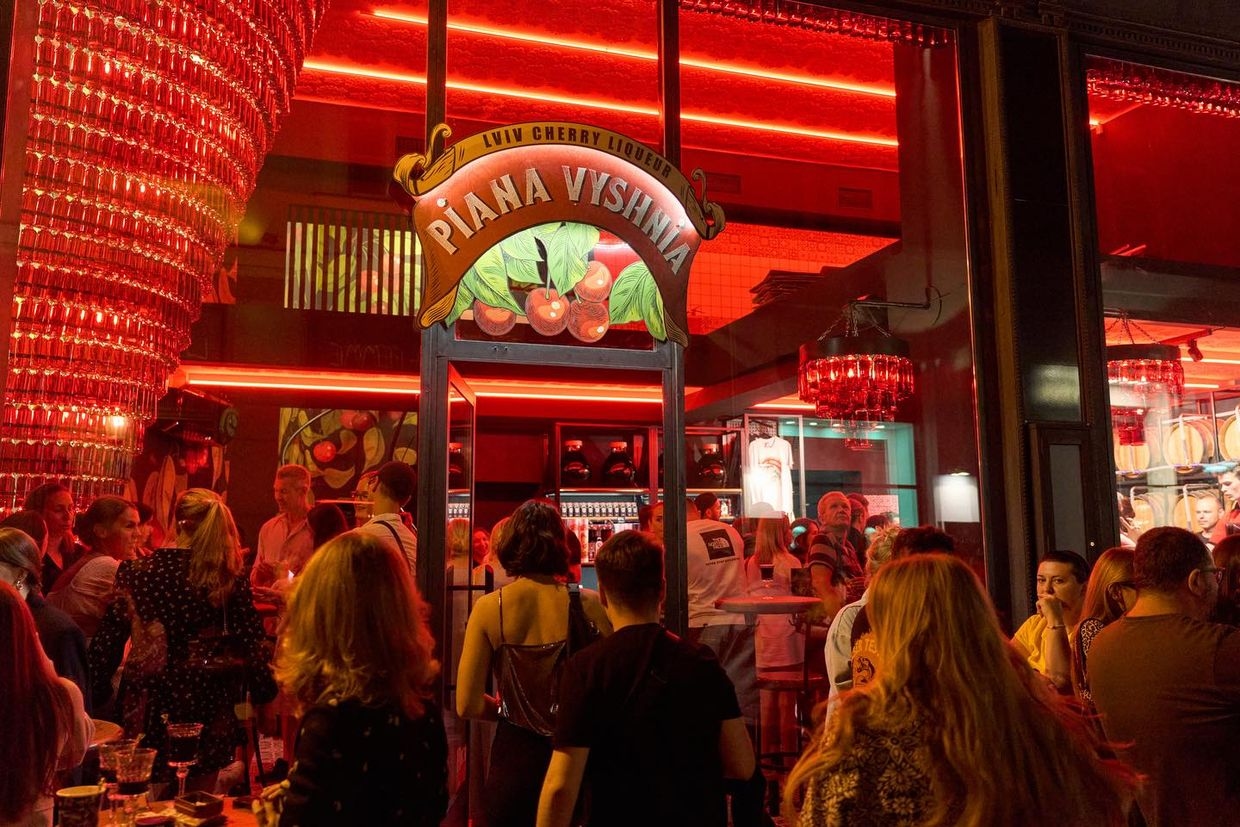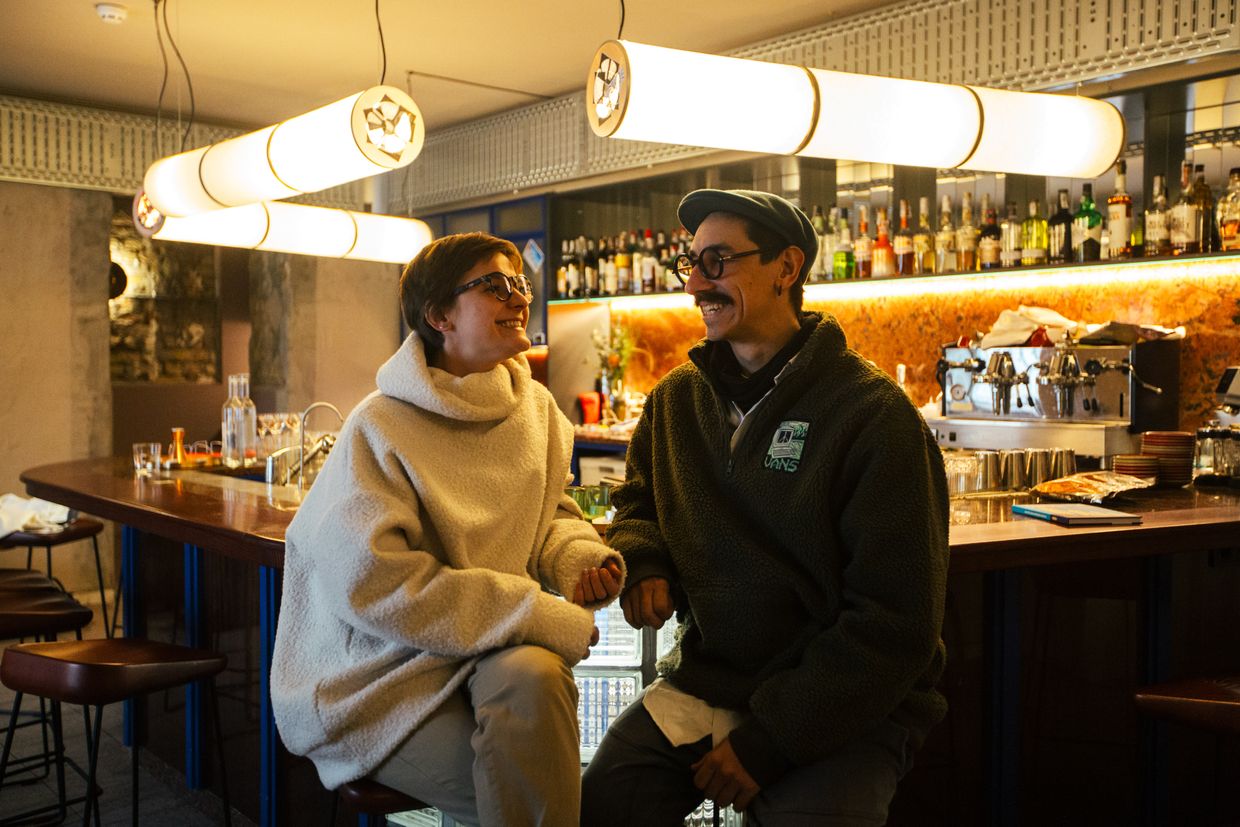Ukraine’s popular ‘Drunken Cherry’ bar opens in London as company expands westward

Customers inside Piana Vyshnia in Ukraine. (Piana Vyshnia/Facebook)
If you are ever a guest for an evening in a Ukrainian home, at some point you can probably expect a narrow bottle of sweet alcohol made from local fruits, known as nalivka, to be placed on the table.
While nalivka is traditionally home-made, in 2015 Ukraine’s largest restaurant group !Fest opened a bar in Lviv that focused solely on selling 17.5% cherry liquor and recreating an intimate homely experience on the cobbled streets of Lviv’s old town.
Piana Vyshnia, or 'Drunken Cherry' in English, has since grown to be one of Ukraine’s most recognizable chains of bars, from Kharkiv in the east to Lviv in the west, which now has six bars. In the capital Kyiv there are eight.
Inside each bar, barrels of liquor line the walls and a soft red glow emanates from sculptural light fixtures. The drink is served from ornate stemmed glasses — the type that in a Ukrainian home may only be reserved for guests.
In March 2024, !Fest brought the ruby liquor to an entirely new market and opened a Piana Vyshnia in London’s Soho district.
Nestled between other pubs and restaurants, on the inside, the bar is practically identical to any Piana Vyshnia you would find in Ukraine.
Though this marks the first franchise opening in western Europe, Piana Vyshnia has experience in branching out beyond Ukraine’s borders. There are more than 20 franchises in nine countries in central and eastern Europe, most of which are in Poland.
London calling
One would think that amid an ongoing full-scale invasion, economic uncertainty would pose the biggest challenge for a Ukrainian company opening a franchise abroad.
“For us, actually the tricky part was to find a location we could rent in the center of London,” Taras Maselko, the head of PR for Piana Vyshnia’s owner !Fest, told the Kyiv Independent.

Piana Vyshnia had to compete with brands that were known in the U.K. and could offer landlords sums that were over the asking price. The process took around five months, Maselko said.
“We are now thinking about opening also other businesses in London, but it's really, really hard to find a second location to rent.”
Piana Vyshnia also faced the same challenges that Ukrainian brands often encounter when launching a brand in an entirely new market.
Non-Ukrainian customers “don't know the traditions, they don't know the type of alcohol that Ukrainians drink,” Maselko said. Some also might find Piana Vyshnia “hard to pronounce,” he said.
The company was therefore not surprised that around 80% of the customers seen in the first days after the opening in London were Ukrainian. One of these was Nika Krykun, a Ukrainian who lives in London.


“It was very impressive to see a Ukrainian bar in Soho,” Krykun told the Kyiv Independent.
She went to the opening with friends, but the queue to get in was so long, that the bar was closing by the time they reached the doors. The group bought four bottles of cherry liquor to take away instead.
“I think the place is definitely going to be popular for Ukrainians based in London, but I’m not quite sure about British people, Krykun said. “The name of the brand is not translated from Ukrainian.”
Cultural differences
Previous openings outside Ukraine have shown that over time, more locals tend to discover the bar, Maselko said, with Poland proving one of the most popular locations among non-Ukrainians.
Polish people are familiar with the drink and the brand, as before the full-scale invasion, Lviv was a popular destination for a city trip for Polish tourists, according to Maselko.
But in neighboring Romania, fewer locals caught on to the brand, partly because of different traditions of drinking homemade liquor and different cultural expectations surrounding drinking alcohol in public, Maselko said.
One key idea behind Piana Vyshnia is that the bar itself is relatively small and has limited seating, to encourage customers to spill out onto the street to continue drinking and talking with friends — something reflected in British pub culture.
Piana Vyshnia bars are always located on a street that is inviting, Maselko explained. There should be attractive architecture surrounding the bar and enough pavement space for customers.
Branching out
Piana Vyshnia hopes that the idea will catch on in Western Europe, which is ripe for the picking compared to the saturated market of Eastern Europe.
Despite the full-scale invasion, the brand is continuing to grow. According to Andriy Khudo, one of the co-owners of !Fest, Piana Vyshnia has its eye on Germany, Spain, the Netherlands, and the U.S., to name a few prospective countries.

A wartime challenge was posed by the fact that Ukrainian men are largely barred from leaving the country, meaning that it was a “quest for our Fest team to open a project remotely when part of the team is in Lviv,” Khudo said on Facebook.
Nonetheless, “the case of London shows that such a challenge is doable,” Khudo said.
!Fest hopes that Piana Vyshnia will develop broader associations with the idea of a product being made in Ukraine, which for a long time was associated with heavy industry or cheap labor.
“We want to show that Ukraine can develop brands itself and create entirely new products,” Maselko said. Foreigners can try a quality product from Ukraine “and be surprised.”
During a full-scale invasion, there is also another factor in mind. Whether it’s producing a cherry liquor, Ukrainian food, or even book publishing, the aim for Ukrainian companies like Fest is “also about spreading our culture around the globe.”












